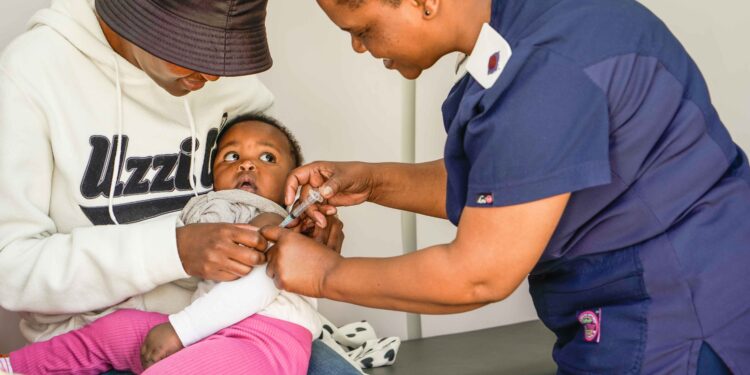At Witkoppen Clinic, we believe that a healthy learner is a thriving learner. As a community-based health facility serving Johannesburg North, we are committed to promoting the well-being of young South Africans. In light of the recent measles outbreak and the growing obesity crisis, we welcome the opportunity to contribute and engage learners in meaningful dialogue about their health.
What is Measles?
Measles is a sickness caused by a virus, and it spreads very easily. If someone with measles coughs, sneezes, or even just shares the same room with you, you could catch it too.
At first, it feels like you have the flu: you get a high fever, a cough, a runny nose, and sore red eyes. After a few days, a red, spotty rash appears on your skin.
Even though measles might sound like a regular childhood illness, it can be very serious. It can make your lungs sick (pneumonia), upset your tummy (diarrhoea), or even cause problems with your brain. That’s why it’s important to get vaccinated and tell an adult if you’re feeling unwell.
The Recent Outbreak: How Bad Is It?
Between October 2022 and September 2023, South Africa had a big measles outbreak. That means lots of people got sick from measles. More than 1,190 cases were confirmed in eight provinces.
In Gauteng, there were 217 cases, especially in places like Johannesburg, Tshwane, and Ekurhuleni.
Most of the people who got sick were kids between 1 and 14 years old. Many of them hadn’t gotten their measles vaccine or weren’t sure if they had. That’s a problem because without the vaccine, your body isn’t protected from the virus.
How Are We Fighting Measles?
South Africa gives free measles vaccines to babies at 6 months and 12 months old. But to stop measles from spreading, 95% of children need to get both doses. In Gauteng, only 76% of kids got their second dose.
To help fix this, the government started special vaccination campaigns for kids up to 15 years old. Clinics like Witkoppen are helping by giving catch-up vaccines and teaching schools and families why vaccines are important.
What Happens If Learners Don’t Vaccinate?
If kids don’t get vaccinated, measles can cause serious problems like:
• Pneumonia (a lung infection that can be deadly)
• Encephalitis (swelling in the brain that can cause damage)
• Blindness, dehydration, and malnutrition
• And in some cases, death, especially for very young children or those who are already sick
Getting vaccinated helps protect you and others—like babies and people who can’t get vaccines for medical reasons.
Gauteng versus Other Provinces
Gauteng had more measles cases than other provinces. Places like the Eastern Cape and Northern Cape had fewer. Gauteng has more people and fewer kids getting vaccinated, which makes it easier for measles to spread.
Obesity: Another Health Problem
While measles is a virus, obesity is a different kind of health issue. It means having too much body fat, and it’s becoming more common in South African children. In fact, 22% of kids under five are already overweight or obese—that’s a big jump from 13% in 2016.
Obesity can lead to:
• Type 2 diabetes
• High blood pressure
• Heart problems
• Mental health issues like anxiety and depression.
At Witkoppen Clinic, doctors and nurses help families learn about healthy eating, exercise, and feeling good mentally. They work with schools to make sure kids grow up strong and healthy.
Our Call to Action.
To all learners: your health is your power. By getting vaccinated and making healthy lifestyle choices, you are investing in your future.
We encourage you to:
• Get vaccinated: It’s safe, free, and saves lives.
• Eat healthy foods: choose fruits, vegetables, and whole grains.
• Stay active: move your body every day.
• Speak up: talk to your parents, teachers, or clinic staff if you have health concerns.
Staying healthy helps you enjoy school, play with friends, and grow up strong!










